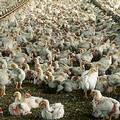 西班牙巴塞隆納一國際性非政府組織GRAIN,針對目前已侵襲大部分國家的禽流感病毒近日發表了一份新研究報告,當中指出小型家禽養殖場和野生鳥類被視為禽流感來源,但這並不公平。報告中提出,這樣的偏見正逐漸擴大,演變成禁止露天養殖、擠壓小型農場的措施,並迫使養殖場引進基因改造雞隻。
西班牙巴塞隆納一國際性非政府組織GRAIN,針對目前已侵襲大部分國家的禽流感病毒近日發表了一份新研究報告,當中指出小型家禽養殖場和野生鳥類被視為禽流感來源,但這並不公平。報告中提出,這樣的偏見正逐漸擴大,演變成禁止露天養殖、擠壓小型農場的措施,並迫使養殖場引進基因改造雞隻。
報告中認為,跨國家禽養殖業才是禽流感問題的根源。GRAIN團體一向主張以在地知識為基礎,對基因資源採取控制,並據此發展農業對生物多樣性的永續經營與利用。
GRAIN成員庫亞克(Devlin Kuyek)指出:「每個人都把候鳥、家庭後院養的雞視為問題焦點,但其實牠們並非禽流感的有效帶原者。牠們會死於禽流感病毒,卻不太可能傳播病毒。」
該報告全文請見:http://www.grain.org/go/birdflu。
Small-scale poultry farming and wild birds are being unfairly blamed for the bird flu crisis now affecting large parts of the world, according to a new report from an international nongovernmental organization based in Barcelona. The report says initiatives are multiplying to ban outdoor poultry, squeeze out small producers and restock farms with genetically modified chickens.
Instead, the transnational poultry industry is the root of the bird flu problem, says the report issued today by the organization GRAIN, which promotes the sustainable management and use of agricultural biodiversity based on people's control over genetic resources and local knowledge.
"Everyone is focused on migratory birds and backyard chickens as the problem," says Devlin Kuyek of GRAIN. "But they are not effective vectors of highly pathogenic bird flu. The virus kills them, but is unlikely to be spread by them."






